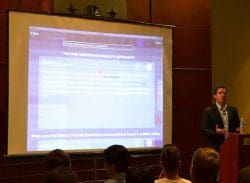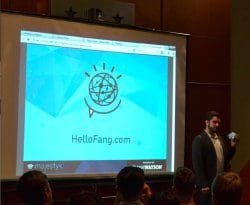When Watson Meets Machine Learning
Our report on a recent Cognitive Systems meetup co-sponsored by IBM Watson and NYU Center for Data Science, IBM Watson Ecosystem, and machine learning applications, from healthcare to cognitive toys. You will want Fang!
By Ran Bi, July 2014.

Healthcare was the first industry that Watson brought meaningful improvement to. Watson was trained to help physicians identify treatment options for cancer patients, to provide approval suggestions to nursing staff, and uncover key information from patients’ medical records.
For example, Modernizing Medicine designed Electronic Medical Assistant powered by IBM Watson to increase physicians’ efficiency. They can not only view past diagnoses and patient files, but also ask questions like “how does methotrexate compare to cyclosporine” as shown in the left screenshot. The most awesome part is that EMA will learn each physician’s unique practice style. Although I do not know how well it works, this a step closer to future healthcare.
Machine learning will enable cognitive systems to learn, reason and engage with us in a more natural and personalized way. These systems will get smarter and more customized through interactions with data, devices and people.
Now Companies can partner with IBM and develop their applications via “Watson Ecosystem”. How can machine learning change our life?
Here are several aspects which may interest you.
Education. What will future classroom look like? I believe personalized textbook, tailored curriculum and robot tutor may become parts of students’ life in the near future. CEO of Majestyk Apps, the winner of IBM Watson Mobile Developers Challenge, presented their cognitive toy, Fang.
Children can talk with it just like with their best friends. This little toy can answer children’s endless questions and satisfy their curiosity to the unknown world. It is not hard to imagine cognitive smart textbook, newspaper, or desk.
Shopping. It is common to expect more personalized shopping experience with the help of Big Data. Imagine an App which recommends clothes in different situations, helps us decide which dress to buy and enables us to try on clothes without getting undressed. (I cannot wait to install it.) Another idea is the combination of online and offline shopping. In this way, we can enjoy the exciting shopping experience and also convenience of quick checkout.
What IBM has done is that it invested in a digital shopping company, Fluid and applied the cognitive power of Watson to e-commerce. In this way, instead of searching keyword, people ask specific questions. Sounds like you have a sales representative everyday.
Online Security. By learning who we are, a digital guardian can make inferences about our activities and alert whenever abnormal things happen. For example, if the guardian detects a purchase of gas, it will “think” the purchase as a highly suspicious one because your car has just re-fueled or you are in the office when this happens.
Future City. What if the city you live can analyze local news and learn to predict what you need? Everyone can share his information like a broken street light, traffic jams via mobile app, and it will generate the most suitable solution to your request based on all the information. Also, sentiment analysis will help city governors with city planing. More machine learning applications can be developed related to city life, like crime prediction, bus routes, street sweeping, automatic air conditioning, etc.
…
Companies can embed Watson’s cognitive capabilities through the use of API and tools on the Watson Developer Cloud. To get access to them, companies need to submit a request.
Maybe this is a choice to start with. If you have any idea to make our mobile phone smarter, it’s never too late to try.
Ran Bi is a master student in Data Science program at New York University. She has done several projects in machine learning, deep learning and also big data analytics during her study at NYU. With the background in Financial Engineering for undergrad study, she is also interested in business analytics.
Related:




